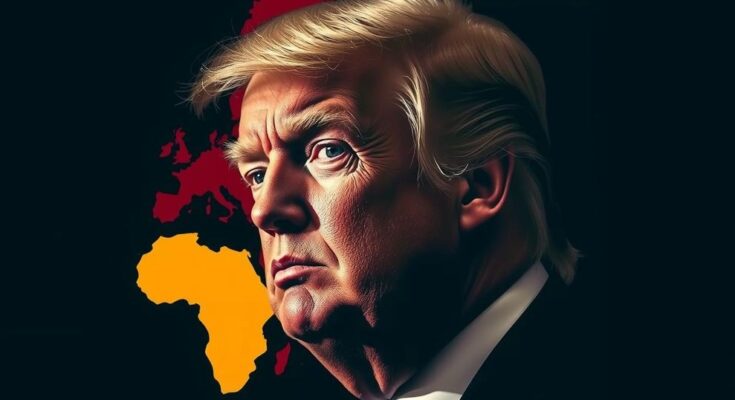Donald Trump’s potential re-election poses both opportunities and risks for Africa, shifting the focus from multilateral diplomacy to transactional politics. His earlier terms saw a decline in U.S. peacekeeping initiatives, fostering instability in regions like Sudan and Ethiopia. The anticipated continuation of this approach could further complicate the continent’s already strained political landscape, particularly influenced by regional dynamics involving Middle Eastern powers.
The re-election of Donald Trump may introduce both opportunities and challenges for Africa, marked by his transactional approach to politics over traditional diplomacy. His previous presidency was characterized by a lack of new peacekeeping initiatives, a trend continued by Joe Biden. Trump’s doctrine, favoring direct deals with autocrats and sidelining multilateralism, raises concerns as African conflicts, such as those in Sudan and Ethiopia, remain unresolved. The African Union (AU) had worked closely with the Obama administration to establish a sustainable peacekeeping framework, but since Trump took office previously, support for African-led peacekeeping efforts diminished. Autocrats, possibly favoring Trump’s style, may welcome his possible return, which could lead to a re-emergence of unilateralism in U.S. strategies towards African nations. Trump’s administration famously favored transactional exchanges, such as mediating the contentious Nile waters dispute at Egypt’s request. His approach under the “illiberal peace” paradigm favored pragmatic arrangements over democratic reforms and multilateral cooperation. This approach often overlooked the plight of civilians in conflict zones and fostered instability across the continent, especially in regions like Sudan and the Horn of Africa. The current dynamics involving Middle Eastern powers add another layer of complexity, as regional players like the UAE and Egypt support conflicting sides in the ongoing Sudan conflicts. Furthermore, Trump’s previous withdrawal of U.S. forces from combat areas points to his disinterest in American military commitments in Africa, raising the stakes for existing conflicts and precarious political climates. As turmoil continues in places like West Africa, where jihadist movements are gaining traction, a possible Trump second term could intersect U.S. foreign policy with Russia’s expanding influence, altering the existing geopolitical landscape. Predictions about Trump’s precise policy outcomes remain unclear, as the current situation requires urgent action to address the continent’s numerous crises. Moreover, the impending leadership elections at the AU Commission highlight the urgency of establishing a cooperative framework for peace and security, with a focus on multilateralism that could counterbalance the potential rise of autocratic governance favored by transactional politics. Trump’s potential presidency may disrupt this trajectory, injecting additional uncertainty into Africa’s security and political stability.
The article examines the implications of Donald Trump’s anticipated return to the presidency for African nations, particularly focusing on his previous administration’s approach to foreign policy. Trump’s transactional style contrasted sharply with conventional diplomacy, particularly concerning peacekeeping efforts and multilateral relations with the African Union. The historical context outlines the significant shifts in U.S. engagement in Africa from the Obama administration, which championed a liberal peace model, to Trump’s focus on direct dealings and autocratic leadership. The interplay of Middle Eastern geopolitical interests and African regional conflicts further complicates the landscape, suggesting that a return to power for Trump could exacerbate existing turmoil in the continent.
The prospect of Donald Trump’s return to the presidency raises crucial questions about future U.S.-African relations. His transactional approach may hinder meaningful diplomatic engagements and the establishment of effective peacekeeping initiatives. As conflicts rage, particularly in Sudan and the Horn of Africa, urgent multilateral cooperation remains critical for fostering stability. The outcomes of these dynamics may well dictate the trajectory of African peace and security, especially under the potential influence of external powers like Russia.
Original Source: www.bbc.com




